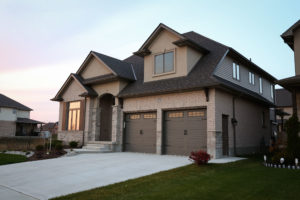
A bigger home means higher utilities, property taxes and home insurance.
Besides the U.S. election, another popular topic of discussion at dinner parties these days is housing. There’s no easy way to put it: Canada is a country obsessed with real estate. We love spending money on home renovations – whether it’s granite counter-tops or stainless steel appliances – and we like our homes big.
Canadians have the third-largest homes out of 15 jurisdictions, finds a new report. The only countries we trail in home square footage are Australia and the U.S. (this shouldn’t come as a surprise since Americans also like their food portion sizes big). In case you’re wondering, last on the list is Hong Kong, where the average home is less than 500 square feet – barely enough room to swing a cat (sorry, Grumpy Cat).
Canadian Home Sizes Double Over the Last Decade
In the last 41 years, the average size of a house in Canada has almost doubled. In 1975, the average house was 1,050 square feet. Fast forward to today and the average size of a house in Canada is nearly 2,100 square feet. Houses may be getting bigger, but families are getting smaller. Fewer people are living under the same roof, yet homes are almost twice the size. Something’s not adding up.
That begs the question, do we really need such big homes? Common reasons for buying bigger homes include entertaining, starting a family and overnight guests. Before you make an offer, ask yourself whether you really want to stretch yourself financially to buy a bigger home. Remember, you’re the one who’s going to responsible for paying the higher mortgage payments, not your family or friends.
Avoid the Common Mistake of “Buying Too Much Home”
A common mistake we make is “buying too much home.” I discuss this in my book, Burn Your Mortgage. Just because the bank says that you can go out and spend $800,000 on a home, doesn’t mean you should. You might be able to find a home with most of the things on your wish list and only end up spending $750,000. Your banker or real estate agent aren’t going to tell you to spend less on a home – that’s up to you.
Before buying a home, take the time to prepare a budget. If you find that your mortgage payments would be too high, consider spending less on a home. Consider buying a slightly smaller home or moving slightly further out – that’s what I did. By buying a home only 10 minutes outside my dream neighbourhood, I was able to buy a nicer house and spend $50,000 less.
Don’t Turn Your Mortgage Into a Life Sentence
Still not convinced bigger isn’t always better? I devote a whole chapter to buying a home you can afford in my book. A bigger homes means spending more on property tax, heating and electricity. You’re not going to want to leave those extra rooms empty, so you’ll spend more on furniture. Instead of a castle, your home will end up feeling like a prison. With your cash flow tied up, you won’t be able to save for long-term goals like retirement. Your spouse could end up leaving because you won’t be able to afford to do anything fun. While your family and friends are going out to restaurants and on fancy vacations, you’ll be stuck inside on a Friday night eating Kraft Dinner and watching Seinfeld reruns (not that there’s anything wrong with that).
Could the End Be Near for Bigger Homes?
The trend toward bigger homes could soon be ending in Canada. With Canada looking to increase immigration due to declining birth rates, new Canadians may not have the same home size expectations as those born and raised here. Also, with the lack of affordable housing in big cities like Toronto and Vancouver, square footage is likely to continue to come down.
The lack of affordable housing has led to what I like to call “creative living arrangements.” It’s given rise to so-called micro condos. At about 300 square feet, micros condos are about the size of two parking spaces. They include space-saving features like a Murphy bed, movable wall panels and fold-out cabinetry. If that’s not cramped enough for you, just this season on Dragon’s Den, there was a pitch for shipping container houses.
While I’m not saying you should trade in your spacious house to live in a shipping container in the wilderness, at least consider more affordable housing options like condos and townhouses, or a slightly smaller house. The last thing you want is your dream house to stretch you financially and turn into a living nightmare.
Sean Cooper is the bestselling author of the book, Burn Your Mortgage: The Simple, Powerful Path to Financial Freedom for Canadians, available now on Amazon and at Chapters, Indigo and major bookstores, and as an Audiobook on Amazon, Audible and iTunes.